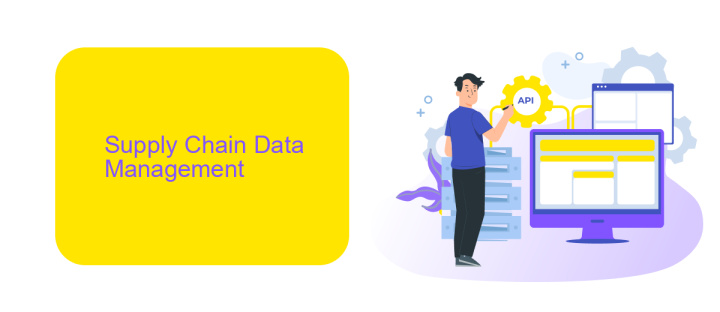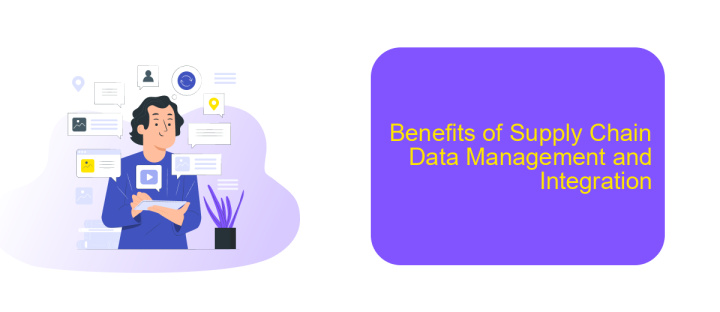Supply Chain Data Management and Integration
Effective Supply Chain Data Management and Integration are crucial for optimizing operations and enhancing decision-making processes. In today's complex and dynamic business environment, seamless data flow and integration across various supply chain components enable organizations to respond swiftly to market demands, reduce costs, and improve overall efficiency. This article explores key strategies and technologies that drive successful supply chain data management and integration.
Introduction
Effective supply chain data management and integration are crucial for businesses aiming to optimize operations, reduce costs, and enhance customer satisfaction. In an era where data is generated at an unprecedented rate, managing and integrating this data efficiently can be a significant competitive advantage. Companies must adopt robust strategies and tools to handle the complexities of data from various sources.
- Data collection and storage
- Data processing and analysis
- Integration of disparate systems
- Real-time data monitoring
Tools like ApiX-Drive simplify the integration process by allowing seamless data flow between different systems and applications. By automating data transfers and ensuring consistency across platforms, businesses can focus on strategic decision-making rather than technical challenges. ApiX-Drive's user-friendly interface and customizable workflows make it an invaluable asset for any organization looking to streamline its supply chain data management and integration processes.
Supply Chain Data Management

Effective supply chain data management is crucial for ensuring seamless operations and decision-making within an organization. It involves the systematic collection, storage, and analysis of data from various points in the supply chain to provide a comprehensive view of the entire process. By leveraging advanced data management techniques, companies can gain insights into inventory levels, demand patterns, and supplier performance, enabling them to optimize their supply chain processes and reduce operational costs.
Integration of data from disparate systems is essential for a unified and efficient supply chain. Tools like ApiX-Drive facilitate this integration by enabling seamless data exchange between different platforms and applications. This service helps businesses automate data workflows, ensuring that critical information is synchronized in real-time across various systems. As a result, companies can improve their responsiveness to market changes, enhance collaboration with partners, and maintain a competitive edge in the market.
Supply Chain Data Integration

Effective supply chain data integration is crucial for optimizing operations and ensuring seamless information flow across various stages of the supply chain. By integrating data from multiple sources, businesses can achieve better visibility, improve decision-making, and enhance overall efficiency. This process involves the consolidation of data from disparate systems such as ERP, CRM, and WMS, allowing for a unified view of the supply chain.
1. Identify data sources: Determine all the systems and databases that generate relevant supply chain data.
2. Choose integration tools: Select suitable tools and platforms, such as ApiX-Drive, to facilitate data integration.
3. Map data fields: Ensure that data fields from different sources are correctly mapped to maintain data consistency.
4. Implement integration: Set up and configure the integration process, ensuring real-time data synchronization.
5. Monitor and optimize: Regularly monitor the integration process and make necessary adjustments to improve performance.
Using services like ApiX-Drive can significantly simplify the integration process by providing pre-built connectors and automation capabilities. This not only reduces the complexity of integrating various systems but also ensures that data is consistently accurate and up-to-date. Ultimately, effective data integration leads to more agile and responsive supply chain operations.
Benefits of Supply Chain Data Management and Integration

Effective supply chain data management and integration offer numerous advantages that enhance operational efficiency and decision-making processes. By seamlessly integrating data from various sources, companies can achieve a holistic view of their supply chain, enabling better forecasting and inventory management.
One of the key benefits is the ability to streamline communication between different departments and stakeholders. This leads to improved collaboration and faster response times to market changes or disruptions. Additionally, integrated data systems can significantly reduce errors and redundancies, saving both time and resources.
- Enhanced visibility across the supply chain
- Improved demand forecasting and inventory management
- Reduced operational costs and increased efficiency
- Better collaboration and communication
- Faster response to market changes and disruptions
Tools like ApiX-Drive facilitate the integration process by offering seamless connectivity between various platforms and applications. This ensures that data flows smoothly across the supply chain, enabling real-time insights and more informed decision-making. Ultimately, effective data management and integration lead to a more resilient and responsive supply chain.


Conclusion
Effective supply chain data management and integration are crucial for optimizing operations, reducing costs, and improving customer satisfaction. By leveraging advanced technologies and robust integration platforms, businesses can ensure seamless data flow and real-time visibility across the supply chain. This enables better decision-making, enhances collaboration among stakeholders, and fosters a more resilient and responsive supply chain ecosystem.
One such platform that facilitates seamless integration is ApiX-Drive, which allows businesses to connect various applications and automate data transfers effortlessly. Utilizing tools like ApiX-Drive helps streamline processes, reduce manual errors, and improve overall efficiency. As supply chains become more complex and data-driven, adopting comprehensive integration solutions will be essential for maintaining competitiveness and achieving long-term success.
FAQ
What is Supply Chain Data Management and Integration?
Why is data integration important in supply chain management?
What challenges are commonly faced in supply chain data integration?
How can automation help in supply chain data management?
What are the benefits of using a service like ApiX-Drive for supply chain data integration?
Apix-Drive will help optimize business processes, save you from a lot of routine tasks and unnecessary costs for automation, attracting additional specialists. Try setting up a free test connection with ApiX-Drive and see for yourself. Now you have to think about where to invest the freed time and money!

